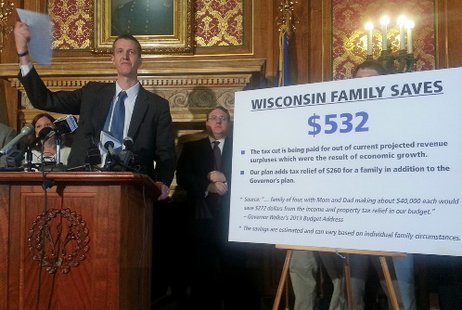Wisconsin business owners will get tax cuts and simplified paperwork if a bill sponsored by state Rep. Dale Kooyenga, R-Brookfield, passes.
The bill was expected to go to a vote in June. It would simplify the state’s tax code, allowing businesses to more easily fill out tax paperwork, and would reduce the number of income tax brackets from five to four.
“I want employers and taxpayers to focus on workforce development, investing in companies, and not trying to navigate a complicated tax code,” Kooyenga said.
Ending Business Credits
Most of the simplifications come from eliminating 18 business tax credits, which were “basically handouts to different companies,” according to John Nothdurft, director of government relations for The Heartland Institute. Some of the credits applied to only one or two companies, he said.
Also under the bill, income tax rates are lowered for all brackets, and the third and fourth (of an original five) brackets are combined. Families earning $28,650 to $315,460 would pay the same income tax rate, 6.27 percent—down from 6.5 (third bracket) and 6.75 percent (fourth bracket).
For families earning more than $315,460, the rate would drop from 7.75 percent to 7.65 percent.
“We still have work to do, but we’re headed in the right direction,” Kooyenga said.
‘Closer to Flat Tax’
Nothdurft called this “another step in the right direction. Fewer tax rates are always better. It’s easier for people to understand what bracket they’re in, and it’s a way of getting closer to a flat tax,” he said.
Flat taxes have been shown to encourage people to be more productive, earn more income, and boost the economy, he said. With a tiered approach to taxes, many people don’t want to move up a tax bracket, so it works as a disincentive for them to produce more, work harder, and earn raises.
Kooyenga said he plans to work on tax reform every two years, lowering taxes bit by bit. He called his plan “fiscally responsible,” noting the importance of moving slowly and striking a balance between lowering taxes and keeping the government running.
“This is a more modest approach to tax reform,” he said. “It’s pretty comprehensive, but we have a long way to go. [Wisconsin is] still a very high tax state, so every two years we’re going to get back at it and do more reforms and make it simpler and easier to understand,” he said.
Wisconsin is “not a state you’d choose to live in if taxes are a factor in your decision,” said John Pavelski, owner of Joseph Company, a small agriculture business in the state.
“Put those tax dollars back in the family’s income stream, and how many mothers wouldn’t have to go to work, or fathers?” he said. “You can’t have kids coming home to a latchkey system and expecting them to watch TV and that morality. … The media is promoting an ideology, a philosophy, and is that really what society wants?”
Modest Improvement
The bill would move Wisconsin from 43rd best state for business tax climate to 40th, according to the Tax Foundation.
“Kooyenga’s plan addresses some longstanding flaws in Wisconsin’s code,” said Tax Foundation Scott Drenkard in a statement. “The plan … fosters[s] an equal treatment of various types of businesses and shift[s] the long-run burdens toward a more pro-growth, consumption-based system.”
Nothdurft contrasted Wisconsin with neighboring Illinois.
“[The bill] shows that there are states that are moving forward on real tax reform, and it’s going to put Wisconsin in a much better position to attract business from states like Illinois, which is moving in a totally opposite direction,” he said. “It’s interesting to see the opposite approach from two different states that are similar to each other and right next door. It’ll be an interesting test case to watch.”




